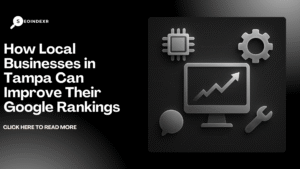Search Engine Optimization (SEO) is constantly evolving with advancements in technology, changes in search engine algorithms, and shifting user behavior. As we step into 2025, the SEO landscape is more dynamic than ever, driven by AI, user intent, and a growing demand for content personalization.
In this blog, we will explore the most important SEO trends that digital marketers, content creators, and businesses must focus on to stay ahead of the competition in 2025.
Table of Contents
Toggle1. AI-First Search Experience
Search engines like Google are increasingly powered by artificial intelligence and machine learning models such as MUM (Multitask Unified Model) and Gemini. In 2025, search results are more context-aware than ever, analyzing language, images, videos, and intent in real-time.
What it means for SEO:
Optimize content for topics instead of just keywords. Structure your content to answer user intent comprehensively. Use entities, semantic keywords, and answer-based formats (like FAQs and how-tos).
2. First-Hand Experience & E-E-A-T
Google’s emphasis on Experience, Expertise, Authoritativeness, and Trustworthiness (E-E-A-T) is growing stronger. The updated algorithms reward content written by individuals with actual experience over generic or AI-generated content.
What it means for SEO:
Showcase author bios with credentials, use quotes from experts, and include case studies, original data, or real-world insights in your blogs. Authenticity and credibility are key in 2025.
3. Visual and Multimodal Search Optimization
Visual search continues to rise with tools like Google Lens and Pinterest Lens. In 2025, users are also increasingly using images, voice, and video to search.
What it means for SEO:
Optimize images with proper file names, alt text, structured data (like Schema.org), and WebP formats. Create short-form videos and tag them correctly with captions and transcripts.
4. Voice Search 2.0 and Conversational Queries
With AI assistants and smart devices becoming commonplace, conversational queries are getting more complex. The new generation of voice search demands deeper and more accurate answers.
What it means for SEO:
Include long-tail, question-based keywords. Structure your content using FAQs, natural language, and schema markup to increase your chance of being a voice result.
5. SGE (Search Generative Experience) Optimization
Google’s experimental Search Generative Experience (SGE) is likely to roll out globally in 2025. It uses generative AI to answer user queries directly on the search page, reducing traditional CTRs.
What it means for SEO:
Focus on content that answers specific questions fast. Use bullet points, tables, stats, and direct answers. Try to appear in AI snapshots by being the most concise and informative source.
6. Topical Authority Over Domain Authority
In 2025, topical authority is becoming more influential than traditional domain metrics. Search engines want to know: Is your site the best source on this topic?
What it means for SEO:
Create content clusters. Cover every angle of your niche through supporting blogs, pillar pages, and internal linking. Consistent content in a niche builds topical relevance.
7. Zero-Click Results and Featured Snippets
With more users finding what they need directly from the SERP, getting featured is more valuable than ever—but it also means fewer clicks.
What it means for SEO:
Format answers in concise paragraphs, lists, and tables. Add clear definitions and use headers (H2/H3) wisely. Featured snippets, People Also Ask, and knowledge panels are prime real estate.
8. Page Experience and Core Web Vitals 2.0
Core Web Vitals have evolved. Google is now considering new metrics in its ranking signals like Interaction to Next Paint (INP), improving how users experience interactivity.
What it means for SEO:
Ensure your site is mobile-first, loads in under 2.5 seconds, and responds smoothly to interactions. Use lazy loading, compress images, and implement proper caching strategies.
9. Local SEO With Hyper-Personalization
In 2025, local SEO is no longer just about NAP citations and Google Business Profiles. It’s about hyper-local signals and contextual content.
What it means for SEO:
Create local landing pages with personalized content. Use local reviews, directions, nearby landmarks, and service-based queries to dominate local pack results.
10. Human-Centric, Trust-Driven Content
With the flood of AI-generated text, users and algorithms are both valuing human-first content. This means well-structured, empathetic, and value-driven content wins.
What it means for SEO:
Go beyond keyword stuffing. Tell stories, solve problems, and build trust. Write as if you’re helping a friend, not just targeting a bot.
Final Thoughts
SEO in 2025 is not about chasing algorithms—it’s about understanding users. Whether you’re optimizing for AI-first search or building content clusters to boost topical authority, one thing remains constant: delivering genuine value.
Stay adaptive, audit your content regularly, and invest in tools and training. The search landscape is changing, but those who keep users at the center will always rank higher.





